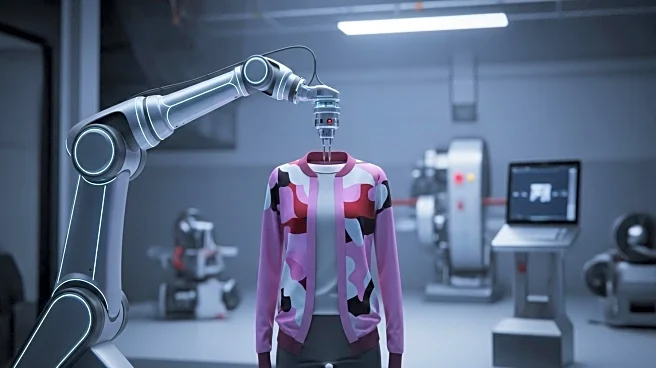What is the story about?
What's Happening?
A new wave of AI-powered startups is transforming the fashion industry by offering innovative solutions for design, marketing, and shopping. The Business of Fashion has identified 18 startups that have collectively raised over $400 million in the past five years. These companies are leveraging AI to help brands reduce costs and quickly adapt to changing trends. Notable startups include Bing, a platform for jewelry design and marketing, Spangle, which uses GPT technology for personalized product pages, and Daydream, a search engine for fashion. These startups are gaining traction by partnering with major brands such as Revolve, Alexander Wang, L.L. Bean, and Skims.
Why It's Important?
The rise of AI in fashion signifies a major shift in how the industry operates, potentially leading to increased efficiency and innovation. By adopting AI technologies, fashion companies can streamline their operations, enhance customer experiences, and stay competitive in a rapidly evolving market. The substantial investment in these startups reflects a strong belief in their ability to drive significant changes. However, they face competition from established tech giants like Shopify and Google, which are also integrating AI into their platforms. The success of these startups could redefine industry standards and create new market leaders.
What's Next?
As these AI startups continue to develop their technologies, they must differentiate themselves from competitors and build sustainable business models to withstand potential market fluctuations. The ongoing race to establish dominance in AI-driven fashion solutions will likely result in a few key winners. Investors are closely monitoring these developments, hoping to back the most promising approaches. The future of fashion may see a blend of AI-driven personalization and traditional retail strategies, with startups playing a crucial role in shaping this landscape.
Beyond the Headlines
The integration of AI in fashion raises questions about the ethical implications of technology-driven personalization and data usage. As companies collect and analyze consumer data to tailor experiences, they must navigate privacy concerns and ensure transparency. Additionally, the potential for AI to replace human roles in design and marketing could lead to shifts in employment patterns within the industry. These developments may prompt discussions on the balance between technological advancement and human creativity.
















